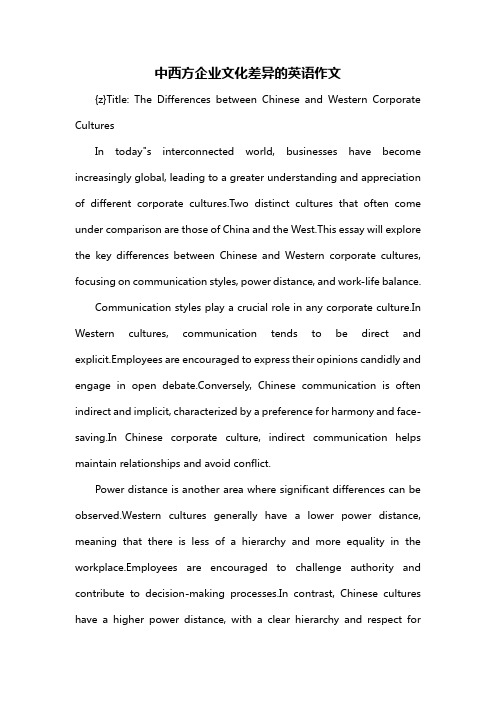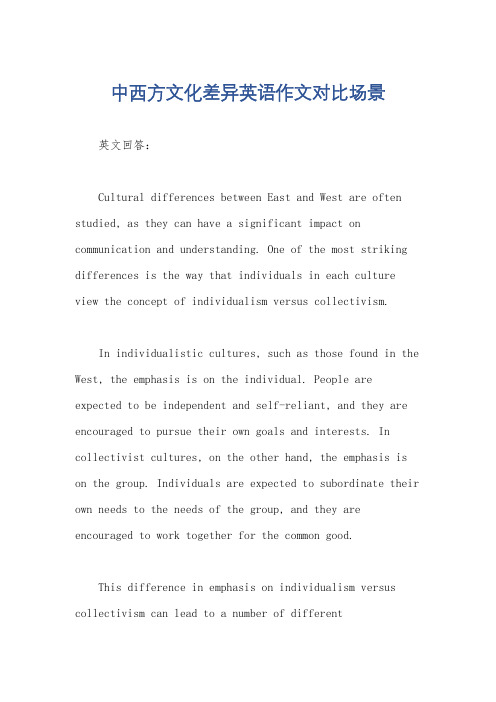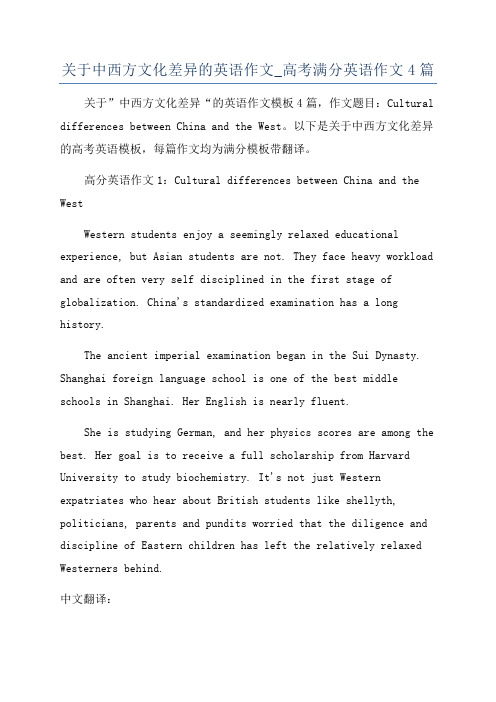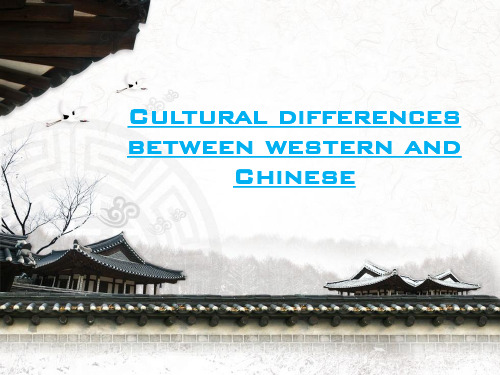浅谈中西方文化差异_英文_
中西方文化差异英语作文对比场景

中西方文化差异英语作文对比场景英文回答:In the realm of cross-cultural encounters, the differences between Eastern and Western cultures often manifest themselves in a myriad of ways. From social interactions to artistic expressions, these contrasting perspectives shape the individuals who inhabit these distinct cultural landscapes.Social Interactions:In Eastern cultures, collectivism holds sway, emphasizing the interconnectedness of individuals within a group. Social harmony and maintaining a sense of "face" are highly valued, leading to a greater focus on politeness, respect, and indirect communication. In contrast, Western cultures embrace individualism, prioritizing personal freedom, autonomy, and direct communication.Artistic Expressions:Eastern art often emphasizes balance, symmetry, and the interplay of negative and positive space. Nature and its elements serve as recurring themes, with a focus on capturing the essence and harmony of the natural world. Western art, on the other hand, tends to exhibit greater individualism, experimentation, and the pursuit of realism.Dining Customs:The act of dining provides a particularly illuminating glimpse into cultural differences. In Eastern cultures, sharing food and communal eating are central to social interactions. Meals are often served in large bowls or platters, with individuals using chopsticks or communal utensils. In Western cultures, individual portions are the norm, and utensils such as knives and forks are typically employed.Hierarchy and Respect:Eastern cultures place great importance on hierarchy and respect for elders and those in positions of authority. Age, experience, and social status are revered. In Western cultures, while respect is still valued, the emphasis is more on equality and meritocracy, with individuals being judged primarily on their abilities and contributions.Time Perception:Time is often perceived differently in Eastern and Western cultures. In Eastern cultures, a more fluid and cyclical view of time prevails, with a focus on the present moment and the interconnectedness of past, present, and future. In Western cultures, time is often perceived as linear and fragmented, with greater emphasis on punctuality and efficiency.中文回答:社会交往:东方文化强调集体主义,重视个人与群体之间的紧密联系。
中西方企业文化差异的英语作文

中西方企业文化差异的英语作文{z}Title: The Differences between Chinese and Western Corporate CulturesIn today"s interconnected world, businesses have become increasingly global, leading to a greater understanding and appreciation of different corporate cultures.Two distinct cultures that often come under comparison are those of China and the West.This essay will explore the key differences between Chinese and Western corporate cultures, focusing on communication styles, power distance, and work-life balance.Communication styles play a crucial role in any corporate culture.In Western cultures, communication tends to be direct and explicit.Employees are encouraged to express their opinions candidly and engage in open debate.Conversely, Chinese communication is often indirect and implicit, characterized by a preference for harmony and face-saving.In Chinese corporate culture, indirect communication helps maintain relationships and avoid conflict.Power distance is another area where significant differences can be observed.Western cultures generally have a lower power distance, meaning that there is less of a hierarchy and more equality in the workplace.Employees are encouraged to challenge authority and contribute to decision-making processes.In contrast, Chinese cultures have a higher power distance, with a clear hierarchy and respect forauthority.In this context, employees tend to defer to superiors and follow orders without question.Work-life balance is also a significant difference between Chinese and Western corporate cultures.In Western cultures, there is a strong emphasis on maintaining a healthy work-life balance.Employees are encouraged to take time off and prioritize personal well-being.In China, however, work often takes precedence over personal life.The "996" work culture, which refers to working from 9 am to 9 pm, six days a week, is not uncommon in some Chinese companies.This dedication to work can lead to a stronger sense of company loyalty and a focus on collective goals.In conclusion, the differences between Chinese and Western corporate cultures are profound, affecting communication styles, power distance, and work-life balance.Understanding and appreciating these differences can help businesses navigate the global market more effectively and foster a more inclusive and diverse work environment.By embracing the unique aspects of each culture, companies can create a harmonious blend that promotes innovation, collaboration, and success.。
中西方文化差异英语作文对比场景

中西方文化差异英语作文对比场景英文回答:Cultural differences between East and West are often studied, as they can have a significant impact on communication and understanding. One of the most striking differences is the way that individuals in each culture view the concept of individualism versus collectivism.In individualistic cultures, such as those found in the West, the emphasis is on the individual. People are expected to be independent and self-reliant, and they are encouraged to pursue their own goals and interests. In collectivist cultures, on the other hand, the emphasis is on the group. Individuals are expected to subordinate their own needs to the needs of the group, and they are encouraged to work together for the common good.This difference in emphasis on individualism versus collectivism can lead to a number of differentcommunication styles. In individualistic cultures, people are more likely to speak directly and honestly, and they are more likely to express their own opinions. In collectivist cultures, on the other hand, people are more likely to speak indirectly and politely, and they are more likely to avoid expressing their own opinions.For example, in a Western culture, it is common for people to say what they think, even if it is critical of others. In a Chinese culture, on the other hand, it is considered rude to criticize others directly. Instead, Chinese people are more likely to say something that is positive or face-saving, even if they do not actually agree with what they are saying.Another difference between Eastern and Western cultures is the way that they view the concept of time. In Western cultures, time is often viewed as a linear progression. People are expected to be punctual and to meet deadlines. In Eastern cultures, on the other hand, time is often viewed as a more fluid concept. People are more likely to be flexible with their schedules, and they are less likelyto worry about being late.For example, in a Western culture, it is considered important to be on time for appointments. In a Chinese culture, on the other hand, it is not considered as important to be on time. Chinese people are more likely to arrive late for appointments, and they are less likely to apologize for being late.Finally, Eastern and Western cultures have different views on the concept of personal space. In Western cultures, people are often uncomfortable with close physical contact. They prefer to keep a certain amount of distance between themselves and others. In Eastern cultures, on the other hand, people are more comfortable with close physical contact. They are more likely to stand close to each other, and they are more likely to touch each other.For example, in a Western culture, it is consideredrude to stand too close to someone. In a Chinese culture,on the other hand, it is not considered rude to stand close to someone. Chinese people are more likely to stand closeto each other, and they are more likely to touch each other.These are just a few of the many differences between Eastern and Western cultures. It is important to be awareof these differences when communicating with people from other cultures. By understanding the different cultural values and norms, you can avoid misunderstandings and build more effective relationships.中文回答:东方文化和西方文化中的差异。
关于中西方文化差异的英语作文_高考满分英语作文4篇

关于中西方文化差异的英语作文_高考满分英语作文4篇关于”中西方文化差异“的英语作文模板4篇,作文题目:Cultural differences between China and the West。
以下是关于中西方文化差异的高考英语模板,每篇作文均为满分模板带翻译。
高分英语作文1:Cultural differences between China and the WestWestern students enjoy a seemingly relaxed educational experience, but Asian students are not. They face heavy workload and are often very self disciplined in the first stage of globalization. China's standardized examination has a long history.The ancient imperial examination began in the Sui Dynasty. Shanghai foreign language school is one of the best middle schools in Shanghai. Her English is nearly fluent.She is studying German, and her physics scores are among the best. Her goal is to receive a full scholarship from Harvard University to study biochemistry. It's not just Western expatriates who hear about British students like shellyth, politicians, parents and pundits worried that the diligence and discipline of Eastern children has left the relatively relaxed Westerners behind.中文翻译:西方学生享受着看似轻松的教育体验,但亚洲的学生却并非如此,他们面临着繁重的工作量,而且在全球化的第一阶段往往非常自律。
中西方文化差异-英文版

例题(14)When you receive something from a foreigner, you
had better___A___.
A. accept it
B. refuse to accept it
C. return it to him D. buy something in rerurn
A. receiver’s, left B. writer’s, right C. receiver’s, right D. writer’s, left
例题(5)When you write a letter to your father
in English, you had better call,“ C Father”.
❖ While the relationship between western people is relatively simple.(简单)
3. From the view of their thinking orientation:
❖ In western countries: Their thinking orientation(思维取向)inclines to individuals ;
A. Chinese B. American
C. British
D. None of the
例题(43)When you send some expensive presents to American and British people, they receive them_______. A. silently B. without doing and saying anything C. and take them away in silence D. and sing high praise for them in the face of the sender
中西方语言文化差异英文PPT

In American culture, anyone can give a compliment or be complimented. Especially the women, who are the object of compliment or praising, may be complimented for the replacement of the hair style and the change of clothing. However, women’s appearance is even the focus of compliments. Regardless of her age, career and social status, she can be complimented. So are the men, children and elderly. When an American woman is complimented, she won‘t feel shy, instead, she thinks it is decent(体面的).
In Chinese culture, praises and compliments have a wider range. It is the same with the American culture that for abilities and achievements, also other serious praise, only those people with the talent evaluation(称赞) ability can praise others. Older can praise young man, but this is only an encouragement, not really compliments on their abilities and achievements. Meanwhile, the younger can praise the older and the lower can praise the superior(地位高的), but this is just a compliment, and this is flattering(谄媚 的) more to those complimented. Therefore, in our daily life, we have a lot of praises for other people's abilities and achievements but they have different meanings on different occasions(场合), not only serious praises, but also a compliment to make the relationship closer.
中西方文化差异_英文版

Differences in education
Chinese education
Western education
Differences in custom
China: shaking hands
western countries: hug
the end
Differences in food
Tea, one of the quintessence of Chinese,we rarely like the British did in the tea add sugar. For the Italians, the average Italian a day to drink twenty cups of Coffee. Westerners eat more meat, more attention to animal protein and fat intake Is the staple food grains, supplemented by vegetables and a small amount of carnivorous plants.
art
Differences in art
1.China painting with ink, and the West with thick paint. 2.The theme of Chinese paintings is landscape but Western is figures
3.Chinese paintings are very beautiful compared with Western painting is very realistic
中西方文化差异(最全完美版)英文演讲

•Culture differences between Western and Chinese
Page 7
usually pay attention to the calories,vitamins,proteins and so on
perple like eating hamburgers, chips,pizza,pasta as their main course
Page 8
1. From the view of social background(社会背景):
Philosophers emphasize on personal characteristics and freedom in ancient Greece.(古希腊社会强调个人特性和自由)
While in ancient China ,we emphasize the relationship between individuals and society. (个人与社会的关系)
Page 5
We prefer noodles, rice,jiaozi as the main course
Page 6
Western
In their opinion, one should choose his food only according to his need as an independent individual and the balanced requirement of all kinds of nutrients for each part of his body.
- 1、下载文档前请自行甄别文档内容的完整性,平台不提供额外的编辑、内容补充、找答案等附加服务。
- 2、"仅部分预览"的文档,不可在线预览部分如存在完整性等问题,可反馈申请退款(可完整预览的文档不适用该条件!)。
- 3、如文档侵犯您的权益,请联系客服反馈,我们会尽快为您处理(人工客服工作时间:9:00-18:30)。
综 合191 #浅谈中西方文化差异文/黄文娟摘 要:中西方文化差异导致了中西方交流中的误解,引起了很多不便。
本文针对日常生活中中西方文化交流中的典型现象如婚姻家庭,餐厅礼仪和日常招呼等进行分析,阐述了这些文化现象后所隐藏的文化内涵和其所植根的文化根基,从个人主义和集体主义,平等概念和等级观念,自我中心和牺牲精神等方面做出解释,为困顿于中西方文化的学习者提供参考。
关键词:中西方文化;现象;文化内涵;文化根基作 者:湖南对外经济贸易职业学院Ñ1Cited phenomenaA 1Mar riageA Chinese gir l got mar ried with an Amer ican boy and sett led down in Los Angeles not far away from wher e her par ents-in -law lived.T he fir st few months went by much smoothly and the Chinese girl got along very well with her new family.Six months later,she got pr egnant and infor med her par ents -in-law at the fir st moment.The r eady grandparents blessed her and her baby and went to Europe where they planned to enjoy a half -year holiday.The Chinese gir l was surprised at their decision:/Don .t you stay to take car e of me and my baby?Don .t you think the baby is the most import ant thing in the family now?0T he parents-in-law also got confused:/We love this baby,but does it mean we should give up our own life and do everything for it?0B 1Rest aur ant customsA young Chinese tourist sat in a Par is caf and or der ed tea.Twice he asked for more hot water to top it up while putting the saucer on the cup to keep the tea warm,as he would have doneat home.T he waiter grew impatient./This Chinese is too stingy t o pay for mor e tea.And doesn .t he know t he saucer goes under the cup to cat ch the dr ips?0T he Chinese man noticed the displeasure on the wait er .s face and lost pat ience himself./This Wester n waiter is r ea lly stingy and silly!Why is he so reluctant to serve me hot water?Why does he put the lid under the cup?0he got angry,and left the caf st eam ing with resent ment.C 1GreetingAn American student Charlie went to China and continued his study in Peking University.Ever ything went well with him except that the Chinese people were hard to understand for him somet imes.One day afternoon,he was on his way back from the super market when he encounter ed two Chinese classmates./H i,Charlie,wher e are you going?0one of the Chinese classmates greeted him./I .m just back from the supermar ket.0H e answer ed./What did you buy?0T he Chinese student continued./Er ,0Char lie felt ver y awkward,/I bought a bar of bread,five apples,a bott le of salad jam and ,0/You don .t have to tell us all these specific t hings,we ar e just greeting you by asking you questions.0/What?You confused me!0Ò.Analysis on the cited phenomenon and the cor responding cultur al implicationsIn the fir st case,both the Chinese girl and her par ents-in -law can keep their own opinion.In China,it is par ents .dut y t o be responsible for their childr en and this responsibility will last(4)勤巡视病房,观察生命体征、面色、意识及有无感染、周围组织坏死等。
当出现因插管技术而导致的并发症(如穿破脐血管造成出血插进或堵塞腹主动脉分支、空气栓塞、血栓形成、误插在门静脉沟处、穿破肝实质等)时,应通知医生尽早拔管,同时给予对症治疗,使症状得以改善。
(5)细菌学检测。
每周1次分别做外周血和脐部穿刺处皮肤的细菌培养。
本组病例共做16次外周血和脐部穿刺处皮肤的细菌培养,无1例发生院内感染等插管并发症。
参考文献:[1]余波,李莎莎.新生儿126例脐静脉插管末端细菌培养的临床分析[J]中国新生儿科杂志,2007(4)[2]宋新志,曹明艳,何咏梅,等.新生儿窒息血肌钙蛋白T 变化[J ]湘南学院学报,2005(1)[3]周宇,周晓光.新生儿胎粪吸入综合征临床分型与特点的初步探讨[J]中国当代儿科杂志,2000(5)[4]高树辉,周杰,张映辉,等.早产儿血脂水平与出生体重的关系[J]中国当代儿科杂志,2003(3)综 合192 WORLDfor t he whole life of t he parents.T hat .s to say,it is normal and natura l that the par ents help their children with anything they can and this kind of /help 0will cover every aspect of their children .s life,thus taking care of their grandchildren should be included undoubtedly.While in most western countr ies,parents .duty for their children will automatically stop when the childr en reach the year of 18.They will be regarded as adults and of cour se they will be in charge of their own life.In the second case,it was nothing more than a common misunderstanding of other people .s customs.The t ourist misinterpreted the waiter .s behavior,and the wa iter misinterpreted what,to the customer ,was a nor ma l request.I n China,people enjoy tea more than coffee,and teahouses are scatter ed ever ywhere in which the customers can enjoy fr ee top -up.While most westerners prefer coffee to tea,and in most western restaurants and cafes,top-up should be charged and tips for waiters and wait resses are necessary.As for t he cups,ancient Chinese people used to enjoy both a lid to keep the tea war m and a saucer to catch the dr ips,while coffee cups usually are accompanied with a saucer only.A fa ilure to understand differ ent customs leads to misunder standing.The third case can be t ypical for foreigners in China.Chinese people a re used to think in groups,with this community spir it,it .s not uncommon to appr oach other s with ually,/Where are you from?0could mean /I .m inter ested in you and ready to be your friend 0;/Are you mar ried?0could mean /If you are still single,I .ll help you find a girlf riend or boyfr iend.0and /What did you buy?0when greeting a shopper ,/H ave you had your meal?0when greeting a friend in the neighborhood could just mean /Hello!0or an invitation to conversation.Obviously,these questions are pr ivate for westerners and make t hem feel uneasy,they even might feel that Chinese are meddling in their affairs.Ó.The cultural basis implied in east-west clashes11Individualism and CollectivismChinese culture is based on collectivism.Instead of consider ing t hemselves individuals,Chinese ar e,above all,members of a communit y.T hey identify more with em ployees of the company,cit izens of the count ry,husbands or wives,or father s or mot her s.They are used to t hink of groups.With this communit y spir it,it .s rather common for Chinese par ents to regard their childr en .s and friends .affair s as their own.West ern culture is founded on individualism.A west erner sees himself or herself both as an individual and member of a community.Thus,wester ner s show more respect t o independence and privacy.2.Equality concept and Class concept/All men are created equal 0,in wester ner s .eyes,people will be self -r espected and show enough respect to others r egar dless of their wealth and family status.Jobs enjoy equality,too.P eople won .t look down upon such people as cleaner s,waiter s and baby -sitt ers etc.Accor ding to them,all workers can be honorable and hard work will always be appr eciated.Chinese cultur e is affected by the t raditional class concept,financial situation,social status,family backgr ound show great influence on people .s growing pr ocess and development.3.Self-center and Sacr ificeWest erners focus on self-center and independence,so they will usually be responsible for themselves and show no interest in other s .affair.Under this kind of culture,people seldom care about anything none of their own business and can be indifferent in Chinese people .s eyes.Chinese people appr eciate a principle as /to be useful for others and the societ y 0.T hat .s to say,in t heir opinion,individual value lies in the devotion to the society.Selflessness and sacr ifice could be virtues in Chinese culture,thus offer ing help and care to others will be quit e common for Chinese people.Ô.ConclusionT he under standing of easter n and western cultures shows great value in acceler ating the cr oss -cultural communicat ion ability.The sound cultural interpr etat ion can help to fully under stand each other and greatly promote t he pr ocess of communication.Reference:[1]Wu Bin,Chinese T eachers .Role in the T eachin g of American Literature,FOREIGN LANGUAGE T EACHING AND RESEARCH ,1994[2]Xu Xiaozhen,New Cen tu ry En glish Integrated Course,SH ANGH AI FOREIGN L ANGU AGE EDUCAT ION PRESS,2008[3]Luo Yaoh ui,Cultu ral Difference and Cultural Introdu ction,JOU RNAL OF FULING T EACH ERS COLLEGE,2006[4]Bi Penghui,A Cultural Introduction in T each ing the Foreign Language,RESEARCH IN TE ACH ING,2006。
